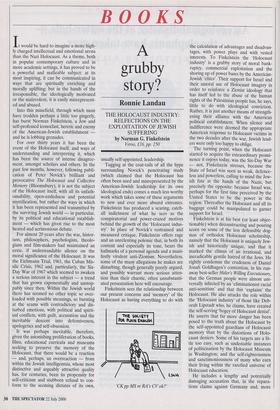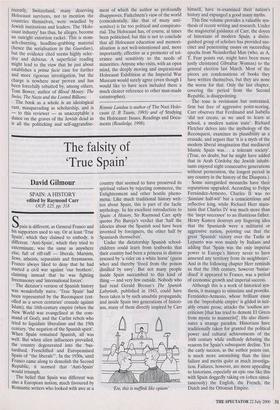BOOKS
A grubby story?
Ronnie Landau
THE HOLOCAUST INDUSTRY: RELFECTIONS ON THE EXPLOITATION OF JEWISH SUFFERING by Norman G. Finkelstein Verso, f16, pp. 150 It would be hard to imagine a more high- ly charged intellectual and emotional arena than the Nazi Holocaust. As a theme, both in popular contemporary culture and in more academic settings, it has proved to be a powerful and malleable subject: at its most inspiring, it can be communicated in ways that are spiritually enriching and morally uplifting; but in the hands of the irresponsible, the ideologically motivated or the malevolent, it is easily misrepresent- ed and abused.
Into this minefield, through which most have trodden perhaps a little too gingerly, has burst Norman Finkelstein, a Jew and self-professed iconoclast, heretic and enemy of the American-Jewish establishment and he is lobbing grenades.
For over thirty years it has been the event of the Holocaust itself, and ways of understanding and interpreting it, which has been the source of intense disagree- ment, amongst scholars and others. In the past few months, however, following publi- cation of Peter Novick's brilliant and provocative The Holocaust and Collective Memory (Bloomsbury), it is not the subject of the Holocaust itself, with all its unfath- omability, open-endedness and potential mystification, but rather the ways in which it has been represented and transmitted by the surviving Jewish world — in particular, by its political and educational establish- ment — which has given rise to the most heated and acrimonious debate.
For almost 20 years after the war, histor- ians, philosophers, psychologists, theolo- gians and film-makers had maintained an eerie, if understandable silence on the moral significance of the Holocaust. It was the Eichmann Trial, 1961, the Cuban Mis- sile Crisis, 1962 and, particularly, the Six- Day War of 1967 which seemed to awaken a serious interest in the subject — a trend that has grown exponentially and unstop- pably since then. Within the Jewish world there has seemed no other topic so over- loaded with possible meanings, so bursting at the seams with contradictory and dis- turbed emotions, with political and spirit- ual conflicts, with guilt, accusation and the inevitable descent into defensiveness, apologetics and self-obsession.
It was perhaps inevitable, therefore, given the astonishing proliferation of books, films, educational curricula and museums seeking to preserve the memory of the Holocaust, that there would be a reaction — and, perhaps, an overreaction — from within the Jewish intelligentsia, whose most distinctive and arguably attractive quality has, for centuries, been its propensity for self-criticism and stubborn refusal to con- form to the seeming dictates of its own, usually self-appointed, leadership.
Tugging at the coat-tails of all the hype surrounding Novick's penetrating study (which claimed that the Holocaust has often been used and misrepresented by the American-Jewish leadership for its own ideological ends) comes a much less worthy work which takes some of these arguments to new and ever more absurd extremes. Finkelstein has produced a searing, catch- all indictment of what he sees as the conspiratorial and power-crazed motives behind the growth of the 'Holocaust indus- try'. In place of Novick's restrained and measured critique, Finkelstein offers rage and an unrelenting polemic that, in both its content and especially its tone, bears the hallmarks of a personal agenda and a mani- festly virulent anti-Zionism. Nevertheless, some of the many allegations he makes are disturbing, though generally poorly argued, and possibly warrant more serious atten- tion than their chaotic, often unsubstanti- ated presentation here will encourage.
Finkelstein sees the relationship between our present concerns and `memory' of the Holocaust as having everything to do with `CK pp MS re RA's CV ok?' the calculation of advantages and disadvan- tages, with power plays and with vested interests. To Finkelstein the 'Holocaust industry' is a grubby story of moral bank- ruptcy, commercial exploitation and the shoring up of power bases by the American- Jewish 'elites'. Their support for Israel and their amoral use of Holocaust imagery in order to reinforce a Zionist ideology that has itself led to the abuse of the human rights of the Palestinian people has, he says, little to do with ideological conviction. Rather, it is just another means of strength- ening their alliance with the American political establishment. When silence and indifference were deemed the appropriate American response to Holocaust victims in the two decades after the war, Jewish lead- ers were only too happy to oblige. The turning point, when the Holocaust started to acquire the extraordinary promi- nence it enjoys today, was the Six-Day War — not, Finkelstein stresses, because the State of Israel was seen as weak, defence- less and powerless, calling to mind the Jew- ish fate at the hands of the Nazis, but precisely the opposite: because Israel was, perhaps for the first time perceived by the United States to be the power in the region. Thereafter the Holocaust and all its baggage could be manipulated to garner support for Israel.
Finkelstein is at his best (or least objec- tionable) when deconstructing and pouring scorn on some of the less defensible dog- mas of orthodox Holocaust scholarship, namely that the Holocaust is uniquely Jew- ish and historically unique, and that it marked the climax of an irrational, and ineradicable gentile hatred of the Jews. He rightly condemns the crudeness of Daniel Jonah Goldhagen's contention, in his run- away best-seller Hitler's Willing Executioners, that the German people were almost uni- versally infected by an `eliminationist racial anti-semitism' and that this 'explains' the Holocaust. He also attacks the role within the 'Holocaust industry' of those like Deb- orah Lipstadt who, he claims, have created the self-serving 'bogey of Holocaust denial'. He asserts that far more danger has been posed to the truth about the Holocaust by the self-appointed guardians of Holocaust memory than by the distortions of Holo- caust deniers. Some of his targets are a lit- tle too easy, such as undeniable instances of politicisation by the Holocaust Museum in Washington; and the self-righteousness and sanctimoniousness of many who earn their living within the rarefied universe of Holocaust education.
He includes a lengthy and potentially damaging accusation that, in the repara- tions claims against Germany and, more recently, Switzerland, many deserving Holocaust survivors, not to mention the countries themselves, were swindled by Jewish institutions and leaders. The 'Holo- caust industry' has thus, he alleges, become an outright extortion racket. This is stom- ach-churning, headline-grabbing material (hence the serialisation in the Guardian), but the evidence cited seems highly selec- tive and dubious. A superficial reading might lead to the view that he just about establishes a prima facie case for further and more rigorous investigation, but the charge is nowhere near proven and has been forcefully rebutted by, among others, Tom Bower, author of Blood Money; The Swiss, The Nazis and the Looted Billions.
The book as a whole is an ideological rant, masquerading as scholarship, and is — to this reviewer — as unacceptable a dance on the graves of the Jewish dead as is all the politicking and self-aggrandise- ment of which the author so profoundly disapproves. Finkelstein's view of the world (coincidentally, like that of many anti- semites) is far too political and conspirato- rial. The Holocaust has, of course, at times been politicised, but this is not to conclude that all Holocaust education and memori- alisation is not well-intentioned and, more importantly, effective as a promoter of tol- erance and sensitivity to the needs of minorities. Anyone who visits, with an open mind, the deeply moving and inspirational Holocaust Exhibition at the Imperial War Museum would surely agree (even though I would like to have seen included there a much clearer reference to other man-made catastrophes).
Ronnie Landau is author of The Nazi Holo- caust (I. B Tauris, 1993) and of Studying the Holocaust: Issues, Readings and Docu- ments (Routledge, 1998).



























































 Previous page
Previous page